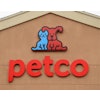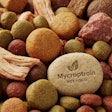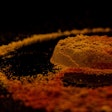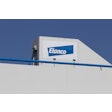.png?auto=format%2Ccompress&q=70&w=400)
Consumer awareness of probiotics in human foods is currently high, with active culture dairy products the fastest growing food segment in the US. According to Simmons Market Research Bureau, nearly half (48%) of the dog- or cat-owning households in the US seek out natural or eco-friendly products for a total population of 25.1 million pet-owning households. As the natural, holistic and organic segments of petfood gain momentum, probiotics, prebiotics and synbiotics are becoming buzz words in our industry. But just how will they make petfood products function better?
It's all about immunity
Probiotics, as defined by the World Health Organization (WHO), are living organisms that, when administered in adequate amounts, confer a health benefit. The "friendly bacteria" are typically non-GMO and are listed as Association of American Feed Control Officials approved as direct-fed microbials. Probiotics have three possible modes of action (Dolfe, 2000):
- Generating immuno-stimulants;
- Producing antimicrobial compounds;
- Competitively excluding other bacteria.
Recent research suggests probiotic bacteria counter disease-causing bacteria in several ways, including preventing pathogen colonization in the intestines by blocking binding sites, producing antimicrobials and organic acids and stimulating the immune response and enzyme activity. The process of "competitive exclusion" when probiotic bacteria block binding sites is one of the most consistent health claims associated with probiotic bacteria observed in many animal species (Danielson, et al ., 1989; Newman and Jacques, 1995; Isolauri, 2001; Saavedra, 2001).
A strong immune system in animals starts with good gastrointestinal health since most of the immune system is located in the digestive tract. In turn, the immune system is affected by the natural intestinal bacterial microflora. Benefits of probiotics in general may include controlling enteritis in dogs, stimulating immune function in puppies, improved oral and fecal odor and overall skin and coat health.
MLF Biotech has developed Liv-Pro, an all-natural, multi-strain blend of live probiotics, to promote gastrointestinal health. Liv-Pro offers a blend of beneficial bacteria that colonizes different segments of the GI tract, according to the company. The supplement has been developed for dogs and cats and is a multi-strain blend of probiotics enhanced with functional ingredients.
Not just yummy in the tummy
Prebiotics that provide a stable complex carbohydrate for altering the gastrointestinal environment and enhancing immunity may soon offer solutions to petfood processing systems. Prebiotics are defined as non-digestible food ingredients that beneficially affect the host by selectively stimulating the growth and/or activity of one or a limited number of bacteria in the colon, and thus improve host health. There are a number of trials that have examined the effects of prebiotics that increase the concentrations of lactic acid bacteria such as Lactobacilli or Bifidobacteria (fructooligosaccharides - FOS) or inhibit pathogens, alter GI tract microbes and modulate immunity (mannan oligosaccharide - MOS).
FOS studies in cats have demonstrated concurrent increases in the beneficial bacteria and decreased concentrations of E. coli and Clostridium perfringens (Sparkes et al ., 1998). Studies examining MOS in dog diets revealed improved digestibility, alterations in GI bacterial populations and improved immune parameters (Swanson et al ., 2002; Zentek et al ., 2002).
Orafti Animal Nutrition specializes in manufacturing functional prebiotic ingredients. Beneo is the brand name developed by Orafti to describe a range of inulin and oligofructose ingredients extracted from the chicory root. The company claims inulin and its long chained fractions are less soluble and ferment more slowly, allowing them to escape fermentation in the small intestine and make their way in to the animal's colon.
According to Orafti, depending on the nutritional focus and the physiological differences between dogs and cats, there may be a preference for either inulin or oligofructose or a combination of both. Both products are available in high purity (neutral taste) and semi-refined (overall palatability whether sweet or bitter) forms.
Gourmetcueticals also offers prebiotic products meant to be utilized in animal feed and petfood. GLPH-1 is a polysaccharide extract from botanical yeast, Candida utilis , that has been shown in more than 20 clinical trials to boost immune function as a prebiotic/anti-inflammatory and stimulate white blood cells, according to the company. It has also been shown through clinical trials to reduce muscle degradation in both animal and human athletes. Prebiotic products like GLPH-1, when used with sport animals, can help reduce the muscle breakdown caused by strenuous exercise and activity.
Focus on safety
To aid in the evaluation of safety of probiotics for humans, a working group of the FAO/WHO has provided a guidance report (Joint FAO/WHO Working Group Report, 2002). The safety assurance tests suggested by this report include, depending upon the species being tested:
- Determining antibiotic resistance patterns;
- Assessing certain metabolic activities;
- Assessing potential side-effects;
- Toxin production testing; and
- Determining potential hemolytic activity.
Examples of common direct-fed microbials are Lactobacillae , Saccharomyces sp., Bifidobacterium as well as the Bacillus sp. Strains of these bacteria selected as probiotics need to be evaluated for safety in each target species.
More advances to come
The number of studies demonstrating the benefits of probiotics and prebiotics in human and animal diets is continuously growing. The body of evidence showing direct beneficial effects in pets is also on the rise. Lines of direct fed microbials developed for premium and holistic petfoods are already being produced.
VDF FutureCeuticals recently introduced its LactiCeuticals line of probiotics, prebiotics and synbiotics. The LactiCeuticals line is based on strains of lactic-acid producing bacteria, alone or in combination with other functional ingredients. FutureCeuticals is a manufacturer of probiotic products and offers a variety of strains in different concentrations for all probiotic applications.
For functional food supplements to really flourish, the process of petfood making may have to change. Because probiotics are living organisms, their stability through processing is an issue that needs to be addressed as extrusion/expansion processing will inactivate these biological products.
Kemin Industries Inc. offers a direct fed microbial for the petfood industry developed to withstand certain conditions associated with manufacturing of pet treats and products. "Depending upon the process, Kemin's proprietary strain of Bacillus subtilis has high survivability during manufacturing and while the product is on the shelf," says Charlotte Jacobs, senior vice president of global marketing for Kemin petfood ingredients. "This probiotic is a spore forming bacteria that can withstand tableting in the manufacturing stage. It does not lose its potency while on the shelf, and does not become active until it reaches the dog's gut."
Kemin's proprietary strain of Bacillus subtilis has been demonstrated to support a healthy gut in mongastrics. [Adapted from Vandenkerckhove, et al . (2006) Kemin Technical Publication BB-06-0093]. Kemin's proprietary strain of Bacillus subtilis has also been shown to produce antibacterial agents surfactin A and surfactin B. Controlled tests on hamsters showed the proprietary strain to be as effective in controlling Clostridium difficile associated diarrhea (CDAD) as the antibiotic Vancomycin.
"The benefits of direct fed microbials like Kemin's proprietary Bacillus subtilis strain, are potentially unlimited," says Giuseppe Abrate, president of the Kemin petfood ingredient business.
Further studies are needed, but many of the initial studies demonstrating the benefits of direct fed microbials in companion animals are promising. Probiotics that are all-natural and non-GMO have great potential to serve as gastrointestinal health aids that are consistent with the current demand for natural and holistic petfoods.






.png?auto=format%2Ccompress&fit=crop&h=167&q=70&w=250)











